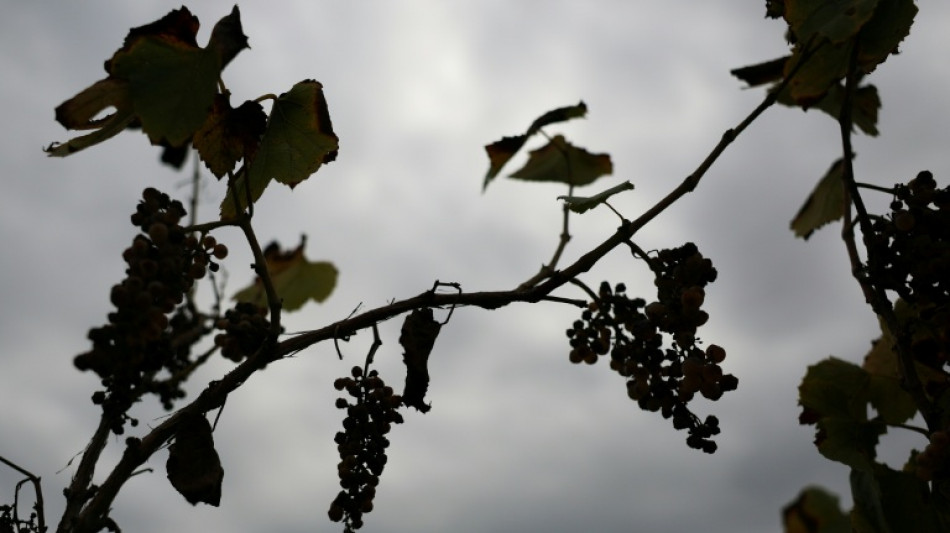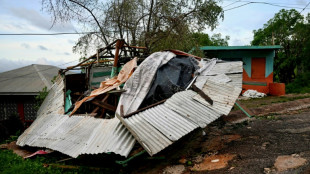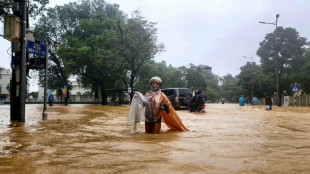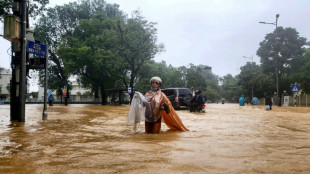
-
 'Amazing' feeling for Rees-Zammit on Wales return after NFL adventure
'Amazing' feeling for Rees-Zammit on Wales return after NFL adventure
-
'Cruel' police raids help, not hinder, Rio's criminal gangs: expert

-
 S. African president eyes better US tariff deal 'soon'
S. African president eyes better US tariff deal 'soon'
-
Sinner cruises in Paris Masters opener, Zverev keeps title defence alive

-
 Winter Olympics - 100 days to go to 'unforgettable Games'
Winter Olympics - 100 days to go to 'unforgettable Games'
-
Kiwi Plumtree to step down as Sharks head coach

-
 France to charge Louvre heist suspects with theft and conspiracy
France to charge Louvre heist suspects with theft and conspiracy
-
US media mogul John Malone to step down as head of business empire

-
 'Never been this bad': Jamaica surveys ruins in hurricane's wake
'Never been this bad': Jamaica surveys ruins in hurricane's wake
-
France adopts consent-based rape law

-
 Zverev survives scare to kickstart Paris Masters title defence
Zverev survives scare to kickstart Paris Masters title defence
-
Rabat to host 2026 African World Cup play-offs

-
 Wolvaardt-inspired South Africa crush England to reach Women's World Cup final
Wolvaardt-inspired South Africa crush England to reach Women's World Cup final
-
US says not withdrawing from Europe after troops cut

-
 WHO urges Sudan ceasefire after alleged massacres in El-Fasher
WHO urges Sudan ceasefire after alleged massacres in El-Fasher
-
Under-fire UK govt deports migrant sex offender with £500

-
 AI chip giant Nvidia becomes world's first $5 trillion company
AI chip giant Nvidia becomes world's first $5 trillion company
-
Arsenal depth fuels Saka's belief in Premier League title charge

-
 Startup Character.AI to ban direct chat for minors after teen suicide
Startup Character.AI to ban direct chat for minors after teen suicide
-
132 killed in massive Rio police crackdown on gang: public defender

-
 Pedri joins growing Barcelona sickbay
Pedri joins growing Barcelona sickbay
-
Zambia and former Chelsea manager Grant part ways

-
 Russia sends teen who performed anti-war songs back to jail
Russia sends teen who performed anti-war songs back to jail
-
Caribbean reels from hurricane as homes, streets destroyed

-
 Boeing reports $5.4-bn loss on large hit from 777X aircraft delays
Boeing reports $5.4-bn loss on large hit from 777X aircraft delays
-
Real Madrid's Vinicius says sorry for Clasico substitution huff

-
 Dutch vote in snap election seen as test for Europe's far-right
Dutch vote in snap election seen as test for Europe's far-right
-
Jihadist fuel blockade makes daily life a struggle for Bamako residents

-
 De Bruyne goes under the knife for hamstring injury
De Bruyne goes under the knife for hamstring injury
-
Wolvaardt's 169 fires South Africa to 319-7 in World Cup semis

-
 EU seeks 'urgent solutions' with China over chipmaker Nexperia
EU seeks 'urgent solutions' with China over chipmaker Nexperia
-
Paris prosecutor promises update in Louvre heist probe

-
 Funds for climate adaptation 'lifeline' far off track: UN
Funds for climate adaptation 'lifeline' far off track: UN
-
Record Vietnam rains kill seven and flood 100,000 homes

-
 Markets extend record run as trade dominates
Markets extend record run as trade dominates
-
Sudan govt accuses RSF of attacking mosques in El-Fasher takeover

-
 Rain washes out 1st Australia-India T20 match
Rain washes out 1st Australia-India T20 match
-
Spain's Santander bank posts record profit

-
 FIA taken to court to block Ben Sulayem's uncontested candidacy
FIA taken to court to block Ben Sulayem's uncontested candidacy
-
Chemicals firm BASF urges EU to cut red tape as profit dips

-
 Romania says US will cut some troops in Europe
Romania says US will cut some troops in Europe
-
Israel hits dozens of targets as Gaza sees deadliest night since truce

-
 Mercedes-Benz reassures on Nexperia chips as profit plunges
Mercedes-Benz reassures on Nexperia chips as profit plunges
-
France tries Bulgarians over defacing memorial in Russia-linked case

-
 BBC says journalist questioned and blocked from leaving Vietnam
BBC says journalist questioned and blocked from leaving Vietnam
-
UK drugmaker GSK lifts 2025 guidance despite US tariffs

-
 Mercedes-Benz profit plunges on China slump and US tariffs
Mercedes-Benz profit plunges on China slump and US tariffs
-
South Korea gifts Trump replica of ancient golden crown

-
 Record Vietnam rains kill four and flood 100,000 homes
Record Vietnam rains kill four and flood 100,000 homes
-
Norway's energy giant Equinor falls into loss


Withering vines: California grape farmers abandon fields as local wine struggles
For more than a century, Lodi's grape growers have supplied the old wineries that make this Californian city famous. But rocketing costs, falling demand and competition from imports mean some are now abandoning their vineyards.
Randy Baranek, whose family has farmed these hillsides for generations, said thousands of acres (hectares) of vines -- a quarter of Lodi's production -- have been removed in the last two years.
"I've never seen anything like this," he told AFP.
Baranek said an acre of vines can produce between eight and ten tons of grapes, which can be sold for a maximum of $3,000.
"Our costs are between $3,000 and $4,500 an acre to farm," he said, as he picked his way through abandoned Chardonnay vines.
"We're twirling the toilet."
Even ripping out the vines is difficult, said Baranek, with California's strict environmental rules making it expensive to convert a field, prompting some farmers to leave them to go wild.
Such abandoned plots have become commonplace in Lodi, where around 130 varieties of grapes are grown, and which is known particularly for its Zinfandels.
- Slowing demand -
The decline in production has been consistent over the last few years, reaching its lowest point in two decades in 2024, when 2.9 million tons of grapes were harvested, said Stuart Spencer, executive director of the Lodi Winegrape Commission.
This year, that figure is expected to fall by a further 400,000 tons.
Spencer says a shift in the shape of the wine market in the United States is at the root of the changes.
After three decades of growth, in which California, Oregon and Washington state forged a domestic consumer base previously enamored with the Old World wines of France, Italy and Spain, the last three years have been challenging.
"The whole spectrum of those that contribute to the wine industry are struggling right now," he said.
On the consumer side, changing tastes and habits mean "people are just drinking less," he said.
The economy is also crimping demand, said Spencer.
"The inflation we've seen over the last few years is really impacting the consumer's wallet."
Vintners are reacting to this slowdown in demand by seeking out other suppliers.
"One of the big changes we've seen here in California is our largest wineries, who are also the largest grape buyers, are choosing to import cheap, bulk wine instead of purchasing local grapes," said Spencer.
That price differential, he says, is the result of a skewed market.
"European wine growers are heavily subsidized by the EU... So we are at a disadvantage. We are not playing on a fair, level playing field."
- Almonds -
Some farmers are reluctantly giving up the grapes, at least on a portion of their land, opting instead for in-demand and lower-cost products like almonds.
It is not a decision they take lightly, because replanting a vineyard can cost tens of thousands of dollars.
It can also affect the wider community, with fewer workers needed for crops like almonds, whose harvest is largely automated.
"There's no other talk on the streets; we're all very worried," said one worker who has toiled in the area's vineyards for ten years. "I don't know what I would do without this."
Kevin Phillips is among those who have made the leap, converting one of his generations-old vineyards to an almond orchard.
The area has good water supplies -- key for thirsty almond trees -- and the crop can cost just a quarter of what it does to farm grapes, he said.
But one of the major attractions for a farmer is that demand is robust, and selling them is very straightforward.
"With wine grapes, you've really got to go out there and you've got to talk to wineries, you've got to make connections, you've got to hope that things work, you've got to hope that all the stars line up," he said.
"Almonds, you don't have to talk to anybody. There's just a demand."
For Phillips, who said he made the difficult decision to rip out his vines after a few bottles of wine, the move is bittersweet.
"It's so much easier" to farm almonds, he said.
"And I hate to say this, because I'm a wine guy."
R.Halabi--SF-PST
